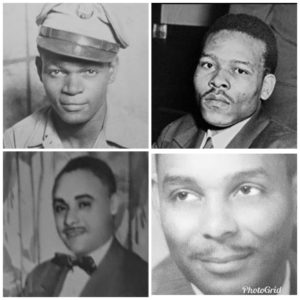Harry Moore and the Groveland Four
[AdSense-A]
When Harry Moore and Harriette Moore met in 1925 and married a year later, these two schoolteachers could not imagine the impact their lives would have on the civil rights movement. Their activism began in 1934 when Harry Moore started the Brevard County NAACP branch. As the executive secretary, Mr. Moore wrote letters protesting the segregation of schools, salary inequalities, and the frustrations of black voters. By 1943, Harry Moore was conducting his own investigations of nearly every lynching that took place in Florida. By 1946, both Harry and Harriette Moore were fired from their teaching jobs by the Brevard County school board.
Life for the Moores changed drastically with their involvement in the Groveland Rape case. In July of 1949, four young black men, called the Groveland Four, were accused of raping a 17 year-old white girl in Lake County, Florida: Walter Irvin, Sammy Shepherd, Ernest Thomas, and 16 year-old Charles Greenlee. According to the 17 year-old female, she and her husband were driving home from a dance when their car broke down. Two of the men stopped to help them, but when two other men stopped, the four attacked her husband and raped her.
Ernest Thomas managed to avoid arrest, but Sheriff Willis McCall along with a mob of over 500 white men, tracked Thomas down and shot him multiple times. He died from his injuries. Law enforcement reported that Thomas had reached for a weapon when he was shot. His death was ruled as justifiable homicide. The family home of Sam Shepherd was also burned to the ground by the angry mob.
Charles Greenlee, Sam Shepherd, and Walter Irvin were arrested and found guilty of rape by an all-white jury. Charles Greenlee was sentenced to life in prison because he was 16 years old, while Sam Shepherd and Walter Irvin who were both World War II veterans, were sentenced to death. But Harry and Harriette Moore would learn that the three remaining Groveland suspects had been brutally beaten by Sheriff Willis McCall as a means of coercing them to confess. Walter Irvin never confessed to committing rape.
Harry Moore fought to have the convictions overturned, and in April 1951, the US Supreme Court overturned the convictions of Sam Shepherd and Walter Irvin on the grounds that there were none of the jury members were black. Charles Greenlee decided not to appeal his case out of fear that a new trial might result in him receiving the death penalty. A retrial was ordered for Sam Shepherd and Walter Irvin, and Sheriff Willis McCall was sent to transport them to their second hearing.
On November 6, 1951, Sam Shepherd was shot and killed by Sheriff Willis McCall while being transported to his pre-trial hearing. Walter Irvin was also shot and critically wounded. According to the sheriff, the men attacked him while trying to escape, and he was acting in self defense. But, according to Walter Irvin, Sheriff McCall yanked both of the men out of his car and then started shooting at them. This led the Moores to call for Sheriff McCall’s suspension and for him to be charged with murder. But no charges were ever brought against Sheriff Willis McCall. A second trial would find Walter Irvin guilty and he was again sentenced to death. But in 1955, the governor of Florida, LeRoy Collins commuted his sentence to life in prison after personally reviewing Irvin’s case. Walter Irvin was paroled in January 1968. A year later, in 1969, he would be found dead in his car. Officials ruled his death as being from natural causes. Charles Greenlee was paroled in 1962. He lived with his family until his death at the age of 78 in 2012.
On Christmas day 1951, six weeks after the calls for Sheriff McCall’s suspension, Harry and Harriette Moore celebrated their 25th wedding anniversary. After they had returned home, a bomb which had been planted underneath their bedroom exploded. Because the nearest hospital would not accept black patients, the Moore’s had to be driven 30 miles to a hospital for treatment. Harry Moore was dead on arrival at the hospital. Harriette Moore died from her injuries nine days later. They left behind their daughters, 23 year-old Annie Rosalea and 21 year-old Juanita Evangeline. Harry Moore was laid to rest on January 1, 1952. Harriette Moore was buried next to him. FBI agents were there to protect their many friends and family. The FBI conducted an investigation, but the case was closed in 1953.
Since their death, the Moore’s have been honored in a number of ways. In 1952, Harry Moore was posthumously awarded the Spingarn Medal by the NAACP. Poet Langston Hughes honored Harry Moore with a poem titled, “Ballad of Harry Moore”. In the 1990s, the Moores’ home was turned into a museum and a landmark. In 2013, the post office in Cocoa, Florida was named in their honor. The Moore’s were also inducted into the Civil Rights Hall of Fame.
In 2005 the case was reopened by Florida’s Attorney General Charlie Crist. His investigation led to the names of four Ku Klux Klan Men who were known for being violent, but were all deceased.
In 2012, FBI records related to the Groveland case revealed evidence that would clear the Groveland Four. The file contained an interview with the doctor who examined the rape victim, who found no evidence that a sexual assault had been committed.
In January of 2019, 70 years after the Groveland Four were wrongfully accused of rape, Walter Irvin, Sam Shepherd, Charles Greenlee, and Ernest Thomas were posthumously pardoned by Florida Governor Ron DeSantis. The woman who claims that she was raped by the four has never retracted her allegations. She requested that the Groveland four not be pardoned “because they did it”. While the Groveland Four was pardoned, they still have not been exonerated. A monument dedicated to the Groveland Four was unveiled in February 2020.


